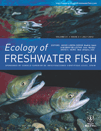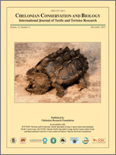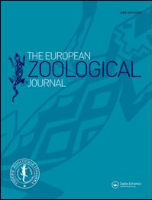
Neotropical Biology and Conservation
metrics 2024
Preserving Biodiversity, One Study at a Time
Introduction
Neotropical Biology and Conservation, published by Pensoft Publishers, serves as a pivotal platform for researchers and professionals dedicated to the understanding and preservation of biodiversity in the Neotropical region. This Open Access journal, operational since 2006 and based in Brazil, invites contributions that delve into the complexities of ecology, evolution, and conservation strategies pertinent to the diverse ecosystems of South and Central America. With a commendable 2023 impact factor reflected in its Q3 rankings across multiple categories including Animal Science, Ecology, and Plant Science, it stands as a valuable resource for academics seeking to publish innovative findings and foster dialogue in these critical areas of study. The journal's commitment to open access ensures that knowledge is readily available to anyone interested in advancing the field of neotropical biology and conservation. Join the global conversation and contribute to the vital work of preserving our planet’s rich biological heritage through rigorous research published in this esteemed journal.
Metrics 2024
 -
- 0.70
0.70 -
- -
-Metrics History
Rank 2024
IF (Web Of Science)
JCI (Web Of Science)
Quartile History
Similar Journals

Acta Brasiliensis
Fostering Global Dialogue on Brazilian Development and ResearchActa Brasiliensis is an esteemed academic journal published by the Federal University of Campina Grande. With an ISSN of 2526-432X and an E-ISSN of 2526-4338, this open access journal has been fostering scholarly communication in the field of Brazilian studies since its inception in 2017. Acta Brasiliensis aims to disseminate high-quality research by providing a platform for scholars, professionals, and students to share their work related to various aspects of Brazilian culture, society, and development. The journal's commitment to open access ensures that its content is freely available, promoting wider accessibility and engagement within the academic community. With a growing reputation in the landscape of scientific research, Acta Brasiliensis is poised to make significant contributions to the understanding of Brazilian studies, thereby advancing discourse and collaboration among researchers worldwide.

Redia-Journal of Zoology
Championing innovation in agricultural and biological sciences.Redia-Journal of Zoology, published by the CRA-Research Centre Agrobiology & Pedology in Italy, is a distinguished academic journal dedicated to advancing the field of zoological studies through high-quality research and insightful reviews. With an ISSN of 0370-4327, this journal provides a platform for scholars and practitioners in the Agricultural and Biological Sciences to disseminate their findings and engage in meaningful discourse. Recognized in the 2023 Scopus rankings as Q2 in its category, Redia occupies a notable position within the global research community, ranked 138 out of 221 in Agricultural and Biological Sciences. The journal has a commitment to publishing original research from 2011 until 2024, contributing to the body of knowledge in diverse sub-disciplines of zoology, ecology, and conservation. While currently not open access, Redia strives to foster collaboration and discussion among researchers, making it a vital resource for advancing zoological sciences.

BIOTA NEOTROPICA
Empowering Research for Conservation and UnderstandingBIOTA NEOTROPICA is a prominent open access journal dedicated to advancing knowledge in the interdisciplinary field of ecology, evolution, behavior, and systematics. Published by REVISTA BIOTA NEOTROPICA since 2001, this Brazilian journal aims to provide a platform for high-quality research that fosters a deeper understanding of Neotropical biodiversity and its conservation. With an ISSN of 1676-0603 and an E-ISSN of 1676-0611, the journal has established its reputation within academic circles, ranking in the Q3 quartile for Ecology and achieving a respectable percentile of 57 in Scopus’s metrics. Operating from its headquarters in Campinas, SP, Brazil, BIOTA NEOTROPICA not only focuses on research dissemination but also encourages collaboration and exchange of ideas among scientists, students, and professionals in the field. The journal is particularly valuable for those looking to contribute to the understanding of ecological systems and promotes accessibility with its open access model.

ECOLOGY OF FRESHWATER FISH
Shaping the future of freshwater conservation.ECOLOGY OF FRESHWATER FISH is a premier academic journal dedicated to advancing the understanding of freshwater fish ecology, published by Wiley in Denmark. With an ISSN of 0906-6691 and an E-ISSN of 1600-0633, the journal has been a critical platform for researchers since its inception in 1992, and will continue through 2024. It holds an impressive Q2 ranking in multiple categories including Aquatic Science and Ecology according to the latest quartiles, reflecting its significance and impact in these fields. The journal is well-regarded with Scopus rankings placing it in the top percentiles for ecology-related disciplines, showcasing its contributions to the understanding of aquatic ecosystems. Although it does not offer open access, the journal is highly valued for its rigorous peer-review process and its commitment to publishing original research that informs policy and conservation efforts. By bridging the gap between theory and practice, ECOLOGY OF FRESHWATER FISH remains a vital resource for students, professionals, and researchers engaged in the study of freshwater environments.

Diversity-Basel
Shaping the future of biodiversity conservation through cutting-edge research.Diversity-Basel is a premier open-access journal published by MDPI, specializing in the vital fields of agricultural, biological, and ecological sciences. Launched in 2009, this multidisciplinary journal, operating from Switzerland, aims to disseminate high-quality research that advances the understanding of biodiversity and ecosystem dynamics. With an impressive impact factor and notable rankings in Scopus, including Q1 classification in Agricultural and Biological Sciences and strong positions in Ecology and Ecological Modeling, Diversity-Basel stands as a valuable resource for global researchers, professionals, and students alike. Its commitment to accessibility enables researchers to reach a wider audience, fostering collaboration and innovation in addressing pressing environmental challenges. By providing an inclusive platform for diverse scientific inquiries and innovations, Diversity-Basel plays an essential role in shaping the discourse on biodiversity conservation and management, encouraging the pursuit of sustainable solutions in our rapidly changing world.

SPIXIANA
Exploring the Wonders of ZoologySPIXIANA is a distinguished journal dedicated to the fields of animal science and zoology, published by VERLAG DR FRIEDRICH PFEIL in Germany. With the ISSN 0341-8391, it has been contributing to the scientific community since its inception, with volumes converging from 2008 to 2024. Although currently listed in the Q4 quartile of the 2023 category rankings for Animal Science and Zoology, it provides a vital platform for researchers and professionals to disseminate significant findings in the field. Despite being unindexed in open access, SPIXIANA ensures that vital research reaches its audience, enhancing academic discourse and furthering our understanding of zoological sciences. Its commitment to sharing rigorous scientific research make it an important resource for anyone passionate about animal biology and conservation.

Journal of Asia-Pacific Biodiversity
Connecting researchers to foster biodiversity insights and conservation.Journal of Asia-Pacific Biodiversity is an esteemed academic journal dedicated to advancing knowledge in the dynamic fields of biodiversity, ecology, and related biological sciences. Published by the NATL SCIENCE MUSEUM & KOREAN NATL ARBORETUM, this journal serves as a crucial platform for researchers and professionals seeking to explore and disseminate impactful findings pertaining to the Asia-Pacific region's rich biological diversity. With an E-ISSN of 2287-9544, the journal is indexed in leading databases, achieving a Q3 ranking across various categories in 2023, including Animal Science and Zoology, Ecology, Insect Science, and Plant Science. It strives to unite scientific research across disciplines, thus fostering a deeper understanding of ecological dynamics and conservation efforts within this vital region. The journal operates with an open access policy, ensuring that findings are widely available for widespread benefit, making it an essential resource for students, researchers, and environmental practitioners alike. Since its initiation in 2013 and continuing through 2024, the journal remains committed to delivering high-quality, peer-reviewed articles that contribute significantly to the global conversation on biodiversity and ecosystem sustainability.

PRIMATES
Exploring the intricate world of primates and their conservation.PRIMATES is a distinguished academic journal dedicated to advancing the field of primatology, published by SPRINGER JAPAN KK. Since its inception in 1957, the journal has served as a vital platform for researchers, professionals, and students passionate about the study of primates, their behavior, biology, and conservation. With a robust publication history extending to 2024 and a current ranking in the Q2 category of Animal Science and Zoology according to Scopus, PRIMATES promotes high-quality research that enhances our understanding of these remarkable species. The journal does not offer open access, ensuring that each article is meticulously curated for its discerning audience, who seek to stay informed of the latest findings and methodologies in primate research. The journal is based in Japan and continues to play an important role in the global scientific community, providing significant contributions to both the academic literature and conservation efforts surrounding primate species.

CHELONIAN CONSERVATION AND BIOLOGY
Fostering knowledge for the survival of chelonians.Chelonian Conservation and Biology is a distinguished academic journal dedicated to advancing the field of chelonian research, encompassing conservation, ecology, and biology of turtles and tortoises. Published by Allen Press Inc in the United States, this journal is well-regarded within the realm of Animal Science and Zoology, as well as Ecology, Evolution, Behavior and Systematics, holding a commendable Q3 ranking in both categories for 2023. With an ISSN of 1071-8443 and an E-ISSN of 1943-3956, the journal features a diverse range of articles aimed at professionals, researchers, and students, fostering an understanding of the critical challenges facing chelonians worldwide. Although not an open-access publication, Chelonian Conservation and Biology provides high-quality content, including original research, reviews, and case studies, encouraging engagement and collaboration among experts. With coverage extending from 2006 to 2024, the journal serves as a vital platform for disseminating knowledge and promoting conservation efforts essential to the survival of these remarkable species.

European Zoological Journal
Fostering Global Collaboration in Animal ResearchEuropean Zoological Journal, published by Taylor & Francis Ltd, is an esteemed open-access publication dedicated to advancing the exciting field of zoology. Since its inception in 2017, this journal has progressively established itself as a vital resource for researchers, professionals, and students alike. With its Q2 ranking in Animal Science and Zoology as of 2023, the journal ranks in the 69th percentile among its peers, showcasing its influence and contribution to the discipline. The journal’s broad scope covers a wide range of topics within zoology, aiming to foster an understanding of animal biology and conservation efforts. As an open-access journal, it not only enhances the dissemination of knowledge but also encourages collaborative research across global communities. Situated in the United Kingdom, the European Zoological Journal invites submissions that contribute to the evolving discourse in animal sciences, and endeavors to support the scientific community in addressing pressing ecological challenges.